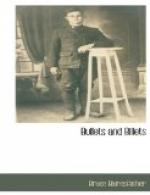After I had washed and shaved under the critical eyes of Angele, Rachel, Andre and Co., I retired into an inner chamber which had once been an apple store, and went to bed on a straw mattress in the corner. Pyjamas at last! and an untroubled sleep. Occasionally in the night one would wake and, listening at the open window, would hear the distant rattle of rifle fire far away beyond the woods.
[Illustration: boy and bird]
These four days at the Transport Farm were days of wallowing in rest. There was, of course, certain work to be done in connection with the machine-gun department, such as overhauling and cleaning the guns, and drilling the section at intervals; but the evenings and nights were a perfect joy after those spent in the trenches.
One could walk about the fields near by; could read, write letters, and sleep as much as one liked. And if one wished, walk or ride over to see friends at the other billets. Ah, yes! ride—I am sorry to say that riding was not, and is not, my forte. Unfortunate this, as the machine-gun officer is one of the few privileged to have a horse. I was entitled to ride to the trenches, and ride away from them, and during our rest, ride wherever I wanted to go; but these advantages, so coveted by my horseless pals in the regiment, left me cold. I never will be any good at the “Haute Ecole” act, I’m sure, although I made several attempts to get a liking for the subject in France. When the final day came for our departure to the trenches again, I rode from that Transport Farm.
Riding in England, or in any civilized country, is one thing, and riding in those barren, shell-torn wastes of Flanders is another. The usual darkness, rain and mud pervaded the scene when the evening came for our return journey to the trenches. My groom (curse him) had not forgotten to saddle the horse and bring it round. There it was, standing gaunt and tall in front of the paraded machine-gun section. With my best equestrian demeanour I crossed the yard, and hauling myself up on to my horse, choked out a few commands to the section, and sallied forth on to the road towards the trenches.
Thank Heaven, I didn’t go into the Cavalry. The roads about the part we were performing in were about two yards wide and a precipitous ditch at each side. In the middle, all sorts and conditions of holes punctuated their long winding length. Add to this the fact that you are either meeting, or being passed by, a motor lorry every ten minutes, and you will get an idea of the conditions under which riding takes place.
[Illustration: kit and kaboodle]
Well, anyway, during the whole of my equestrian career in France, I never came off. I rode along in front of my section, balancing on this “Ship of the Desert” of mine, past all the same landmarks, cracked houses, windmills, estaminets, etc. I experienced innumerable tense moments when my horse—as frequently happened—took me for a bit of a circular tour in an adjacent field, so as to avoid some colossal motor lorry with one headlight of about a million candle-power, which would suddenly roar its way down our single narrow road. At last we got to the dumping-ground spot again—the spot where we horsemen have to come to earth and walk, and where everything is unbaled from the limbers. Here we were again, on the threshold of the trenches.




